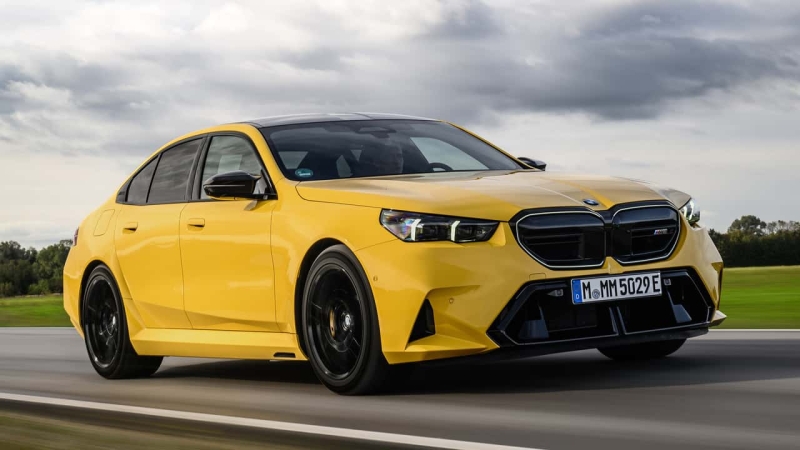That might sound like a good thing, but in the real world it’s a bit of a problem.
BMW
Let’s get this out of the way. The 2025 BMW M5 weighs 5,390 pounds. That’s nearly two Toyota GR86s. It’s more than two Mazda Miatas. It’s the same as an adult white rhinoceros. This is a heavy car. It’s been the main talking point about the M5 since its debut. BMW has made a lot of noise about how the car hides its weight and doesn’t feel that heavy.
For so long, BMW didn’t worry about having the most powerful car in any given class. It didn’t need to have the standout figures or in-your-face design. It was all about balance, creating a car that was, at its core, fun to drive. The M5 isn’t just a sports sedan, it’s the sports sedan, a nameplate that spurred on an entire segment. These were subtle cars that could spend all morning on the highway, all afternoon on the race track, and still be fun on a backroad in the evening. A true all-purpose vehicle for a very particular group of people.
The last few generations of M5, though, have shifted priorities. Now they aim to deliver big horsepower with wild acceleration numbers, suffering weight gain in the process, and changing the M5’s ethos from a do-it-all sports sedan to barnstorming grand tourer. This newest M5, the G90, completes that journey.
| Quick Specs | 2025 BMW M5 |
| Engine | Twin-Turbo 4.4-Liter V-8 Hybrid |
| Output | 717 Horsepower / 738 Pound-Feet |
| 0-60 MPH | 3.4 Seconds (est.) |
| Weight | 5,390 Pounds |
| Base Price / As Tested | $120,675 / $150,000 (est.) |
In some ways, this M5 is not obviously heavy. The batteries—because this is a plug-in hybrid—are in the floor. That keeps the bulk of the M5’s heft low, limiting weight transferring moments that can feel disconcerting. The M5 doesn’t judder over bumps or roll in corners. But just because it doesn’t always feel heavy doesn’t mean you don’t know it is heavy. The M5 shows its weight on transitional throttle applications, where you can feel the fore/aft heave of the body as you gain or lose speed. And gaining and losing speed is something the M5 is extremely adept at.
The familiar S68 twin-turbo 4.4 liter V-8 combines with batteries and an electric motor in the gearbox to produce 717 horsepower and 738 pound-feet of torque. Combining immediate electric torque with the already wild V-8 engine makes for a combustion car that accelerates like an EV. No delays, no lag, just linear power from a standstill until you take your foot off the gas. I cannot emphasize just how outrageously fast this car is.
On the de-restricted section of the Autobahn outside of BMW’s headquarters in Munich, the M5 felt like it would never stop accelerating. I repeatedly hit 170 miles per hour as if it were nothing before traffic slowed us down. The top speed with the M Drivers Pack is 190 mph, but with how strongly it pulled to 170, it feels like it would never stop gaining speed. And when that traffic did show up, the brakes felt strong and linear, with no let-up in pedal consistency as the motors recharged the M5’s batteries under braking.
Those batteries also let the M5 go about 25 miles on a full charge, but they will never fully discharge. Since the brutal performance relies on an assist from the battery, if the battery were to hit 0, then the M5’s performance would take a massive hit. So it keeps a mile or two in reserve when EV mode runs out to assist with performance, the M5 uses braking and the engine to keep the 22.1-kilowatt-hour (14.1-kilowatt-hour usable) battery charged.
Like all M cars, the new M5 has a truly wild number of modes and settings you can select in iDrive. You can adjust the gearbox shift speed, the throttle maps, the brake feel, the engine sound, the steering feel, traction control, turn off power delivery to the front axle, and more. Then there are the hybrid modes, the electric modes, and pre-setting for track driving. It’s truly overwhelming.
If early M5s, like the E28, E34, and E39 were analog cars, this new G90 generation has become 100 percent digital. I’ve always been a fan of letting engineers lock in the best settings to make a car enjoyable in the widest variety of conditions, rather than providing granular adjustment of each setting to the driver, leaving them to constantly fiddle during every driving scenario.
Like M5s of old, I expected this G90 to shine on the autobahn and then be a star on the German b-roads. Here’s where things get complicated. The G90 is still hugely fast, but its size and speed become a detriment off the highway. First, this is a wide and long car with limited visibility. So on narrow backroads, it just feels large—there’s a lot of car around you. Unlike the autobahn, backroads in Germany have a top speed limit of 60 mph. Even at a pace above that limit that I’d consider brisk, the M5 felt bored. It never felt like it was working hard or engaging with me. The limits are simply too high to experience on the road, the place where this car will spend the majority of its time.
When we drove a prototype of the M5 on track, we did get closer to those limits, but that’s a controlled environment that even BMW admits most M5 owners won’t see. And when asked why those limits, if too high for the road, weren’t reduced, BMW said they cannot go backward. That people want more. A comment on the current state of the car market, for sure.
BMW had a number of past M5s on hand as well, and I took the E39 and E60 out for short drives. The E60 was the first M5 that became techy, with iDrive, a ton of drive modes, a not-very-good single-clutch automated gearbox, and a 507-hp V-10 under the hood. But on similar roads and the Autobahn, it felt smaller and more alive, the limits of its performance more accessible. And the E39, well, that is still a defining sports sedan. A 394-hp V-8 and a six-speed manual. Subtle design. And just a sweetheart to drive quickly or slowly.
The new M5 is comfortable with a beautiful interior. It’s fuel efficient, and loaded with useful tech, like augmented reality navigation. But it’s no longer for someone who wants to have fun on a back road at legal or even semi-legal speeds. This M5 is for taking the family from Munich to Como for a long weekend, sitting at 170 mph for a chunk of it. Think of the new $120,675 M5 as a grown-up, executive-class grand tourer. The M3 has taken the position of the old M5 as the do-it-all family sedan, and that leaves the M2 as the rowdy track rat.
The M5 used to chase balance and engagement, and now it chases numbers. Once you choose to chase numbers rather than joy, you cannot go back. I wish we could.
BMW
Competitors
- Audi RS7 Performance
- Porsche Panamera Turbo S E-Hybrid
- Cadillac CT5-V Blackwing
Get the best news, reviews, columns, and more delivered straight to your inbox, daily. Sign up For more information, read our
Privacy Policy and Terms of Use.
Gallery: 2025 BMW M5 First Drive Review
BMW
2025 BMW M5
Engine Twin-Turbocharged 4.4-Liter V-8
Motor Single Permanently Excited Synchronous Electric
Battery 22.1 Kilowatt-Hours (14.1 Kilowatt-Hours Usable)
Transmission Eight-Speed Automatic
Drive Type All-Wheel Drive
Speed 0-60 MPH 3.4 Seconds (est.)
Maximum speed 190 MPH (Electronically Limited)
Weight 5,390 Pounds
Efficiency 15 City / 21 Highway / 17 Combined (est.)
Seating Capacity 5
Cargo Volume 16.5 Cubic Feet
Base Price $120,675
As-Tested Price $150,000 (est.)
On Sale 2025



